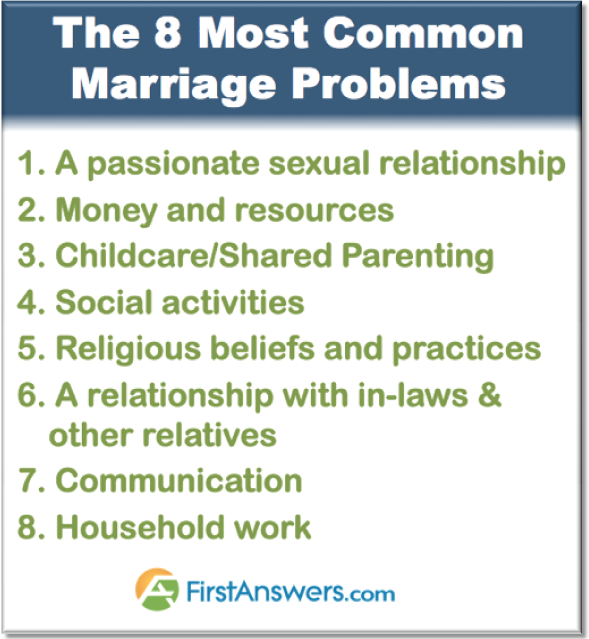Positive Emotional Methods—SHARING— Solve the 8 Most Common Marriage Problems
Yes, in the title we gave away the secret to a more positive and emotionally self-reliant marriage. But that's what we do. We help early and quickly. Now read about how to use the positive relationship self-reliance method of sharing to strengthen your marriage in these common marriage areas we all experience.
Most married couples live together under the same roof and will naturally share shelter, food, and worldly goods. Individuals also bring to the relationship their cultural backgrounds, philosophies about life, and numerous attitudes about what to believe and how to behave. These are shared as a function of spending time together and talking to learn about each other.
But there are eight areas couples share that have the most importance. This is partly because they have practical impact on daily living, and they are the parts of marriage that are laden with emotional importance. Frequent conflict, when not managed effectively, is why the eight areas you share are also the likely source of the most common marriage problems. If you accept the fact that you cannot avoid sharing in marriage if you want love and fulfillment, your only choice is to learn more accurately what to share and how to do it.
Marriage invites two people to share a sexual relationship, money and resource management, childcare, association with parents and in-laws, religion, methods of communication, household work, and social lives. Collectively these represent the reasons why marriage is more different than any other relationship.
Simply stated, people report more love and happiness when both participate in a genuine partnership involving the sharing of these eight areas.

- A passionate sexual relationship. This includes all forms of affection, warmth, expressions of love, and sexual activity (or lack thereof). The sexual relationship is very important in marriage because how it is orchestrated is also often how well other parts of the relationship are being conducted. Often couples do not agree on how often to have sex, how to act during sex, who is to initiate it, and the role it plays in their relationship. The kind of sharing involved in the sexual relationship covers much more than the mechanical acts of intercourse; it is all of the affection, warmth, and sexual communication experienced. To some degree, every husband and wife has the need to share sexually with each other and will pattern their sexual relationship in ways to suit themselves and their partner.
- Money and resources. This includes all activities, conversations, and management skills related to money, possessions, and resources needed for living. The obligations, privileges, and decisions related to the management of money and resources comprise an area of mandatory sharing. Do you agree on who should manage the money, what it is spent on, whether to budget or not, and how to manage times when there is a lot of money and when there is not? When making financial decisions, are you a person who wants experiences or a person who wishes for possessions?
Again, the way a married couple shares may be based on their own preferences or past experiences, but every married couple will choose some system of money management and will share in the discussion of financial problems. - Childcare. This includes all activities, discipline, teaching, and conversation involved in the rearing of children. This area also includes the inadequacies, non-involvement, and indifferences between parent and child. What are your ideas about discipline, managing child behavior, what to do when a child makes a mistake, whether to be firm and strict or flexible? What are your methods of teaching right and wrong, and who should be involved when this teaching takes place?
Even those who have no children, by choice or misfortune, will share the experience of being childless. Childcare is one area that is so complex for many couples that it alone consumes much of their time and energy. - Social activities. This includes all social events (experienced together or separately), all friendships, and all relationships with business and personal acquaintances. Married people share in social experiences with one another, together with others, and separately with others. Do you like an expansive social life? Are you very concerned about your social image, or do you care little? How often do you want to eat out, go out with friends, or be alone? What forms of social behavior are unacceptable to you? How much value do you place on courtesy, manners, and etiquette? What do you do if your partner has different ideas than you do?
- Religious beliefs and practices. This includes all religious beliefs and all participation or non-participation in religious activities. A couple must come to some kind of agreement concerning religious matters, whether one or both spouses will be involved in an established pattern of religious worship through a church or whether one or both will have little or no identifiable religious beliefs. Since religious beliefs generally have some bearing on the behavior and moral instruction of children, this area is a difficult one to ignore.
Do you want a strong and active life in an organized religion? Do you wish to have private beliefs that are not part of a church or religious institution? How much time do you want to spend in religious-oriented activities? Do you respect one’s religious beliefs, or do you tend to think that religious ideas limit people and are a sign of weakness? - A relationship with in-laws and other relatives. This includes time spent with and thoughts and feelings concerning parents (natural parents and in-laws), grandparents, and other close relatives. Marriage requires that each person begin a relationship with the spouse’s relatives. The quality of the marriage influences and is affected by the way a couple shares time and resources with their extended families. How close are you to your parents and family?
How close do you want to be? Do you wish to have positive experiences with in-laws or avoid them? How do you wish to communicate that you love and care for your family? What does your spouse do? - Communication. This includes the kind of conversation each person prefers, how much time is spent talking, how and when you talk, why you talk to each other, and the importance each person gives to it. Do you talk things through when there is a difference of opinion? Do you talk soon after one has been offended, or do you avoid talking and withdraw from the situation? Can you talk to each other about any subject, or do you avoid some topics because they seem too volatile?
Women generally like to talk because they use conversation to establish a feeling of closeness or intimacy. Men can learn this, but they often have to struggle against a cultural belief that talk is a sign of weakness or emotional immaturity.
In marriage it is not possible to not communicate because all behavior, including words and actions or a lack thereof, can convey meaning. Marital satisfaction is closely related to whether the words used by each person had the same emotional meaning for both—that is, whether the emotions of the person sending the message evoked similar emotions with the receiver. Good communication does not depend on what people talk about; it is how they do it that makes the difference. Generally speaking, the more couples talk and communicate with each other, the more satisfied they are with their marriage. - Household work. With the increase in the number of working women, this has become one of the most heated topics between married people. Both spouses work, so why don’t both share fairly in the tasks of getting household chores completed? The answer? Old traditional roles die hard. Many men still think their “work” is completed when they come home. House repairs and cleaning, yard work, meal times and clean up, shopping, car maintenance, and many other activities are part of this area of sharing.
Now think about what this sharing means. Instead of just getting mad, accusing, or doing other unproductive things, you can focus your attention on the real causes of problems and their solutions. Adjustments must be made to make things more fair and just and/or to find more pleasure in sharing the very important tasks that marriage requires.
Talk things through, find ways to compromise, make certain each person is heard and attended to, spend time sharing together, and forge partnership bonds that ensure each person is thought about and cared for.
Click here to learn more about how to share in your marriage relationship.
 RSS Feed
RSS Feed